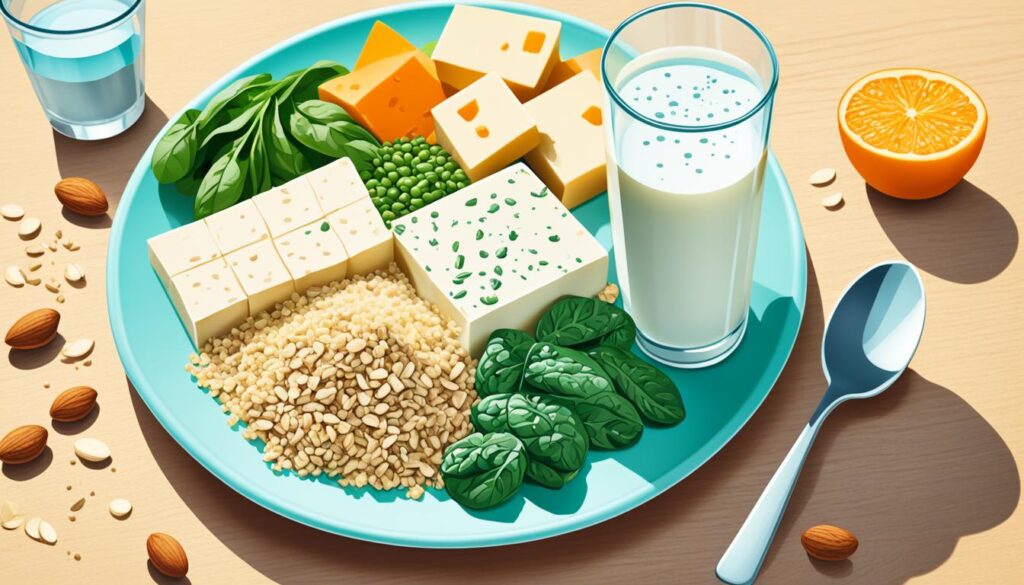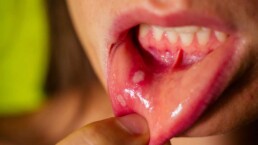By your early 20s, if milk, cheese, or ice cream make you feel bad, you’re not alone. About 30 million adults in the U.S. face lactose intolerance. The good part? You can ease this discomfort with OTC meds and natural options. So, when gas, bloating, or diarrhea hit, relief without strong meds is possible.
Table of Contents
ToggleFeeling bad kicks in from 30 minutes to two hours after having dairy. Your body not breaking down lactose properly is to blame. This undigested sugar then causes trouble in your belly, messing up your day.
Understanding Lactose Malabsorption
Lactose malabsorption is also called lactose intolerance. Lots of people around the world have it. This happens because they don’t have enough of a special enzyme. This enzyme, called lactase, breaks down lactose. Lactose is the sugar in dairy products.
What is Lactose Malabsorption?
The gut needs lactase to digest lactose. If there’s not enough, problems start. Lactose can’t be digested well. So, it moves through the gut without getting absorbed.
Causes and Symptoms
Here are the main causes of lactose intolerance:
- As we get older, lactase production can slow down
- Some health conditions can hurt the small intestine, affecting digestion
- It can also run in families. Some groups are more likely to have it than others
The most common symptoms of lactose intolerance are:
- Feeling bloated and gassy in the belly
- Getting queasy and throwing up
- Having diarrhea
- Feeling cramps or sharp pains in the stomach
- Hearing funny noises coming from your stomach
These signs usually show up 30 minutes to 2 hours after eating dairy or lactose-rich foods.
Over-the-Counter Remedies
If you have trouble with lactose, some OTC meds can ease your symptoms. These won’t cure lactose intolerance. But, they can help with gas, bloating, and diarrhea from not digesting lactose well.
Gas Relief Medications
Medicines that help with gas, like simethicone in Gas-X, can make you feel better. They break up gas bubbles in your stomach. Then, you can get rid of them easier.
Anti-Diarrheal Medications
If diarrhea is your main issue, loperamide (Imodium AD) offers a quick fix. It slows down how fast your intestines move. This helps your body absorb fluids and nutrients better.
You might also try products that handle more than one symptom, like Imodium or Pepto-Bismol.

But remember, OTC meds are just a short-term fix for lactose troubles. Always talk to your doctor. They can help make a plan that looks at the real cause of your lactose intolerance.
Natural Remedies for Lactose Malabsorption
Over-the-counter medicines can help with lactose intolerance. But, there are natural ways to fight it. These ways aim to make your stomach feel better and cut the pain from lactose malabsorption.
Exercise and Gentle Movements
Doing easy exercises helps deal with lactose issues. A slow walk or light yoga can unwind your belly muscles. They make your digestion work better. This cuts down on gas, bloating, and pain.
Herbal Teas and Supplements
Some teas and supplements may ease lactose symptoms. Teas like peppermint and fennel can lower gas. Techniques like stomach massage may also help.
Using lactase enzyme supplements can make dairy easier to digest. Probiotic foods and supplements are good, too. They contain helpful bacteria that can improve your belly health.

Always talk to a doctor before trying new remedies. This is extra important if you have other health issues. A doctor can guide you to the best way to handle lactose intolerance and boost your digestion.
Dietary Modifications
Changing your diet is often the best way to deal with lactose intolerance. By making smart food choices, you can feel better and live well.
Low-Lactose Diet
To deal with lactose intolerance, try eating less lactose. This means cutting back on milk and dairy. Instead, choose yogurts and hard cheeses that have less lactose.
Some people with lactose intolerance can handle a bit of lactose, like what’s in one cup of milk. If you’re careful and start slowly with dairy, you might find a good balance for you.
Lactose-Free Alternatives
If you can’t have dairy, there are many milk alternatives to try. Soy, almond, and other plant-based milks are easy to find. They have added nutrients and are good for you.
Lactose-free dairy is another option. Products like milk, yogurt, and cheese without lactose are also healthy. They’re great for people who need to avoid lactose.

Choosing a low-lactose diet and non-dairy options helps a lot with lactose intolerance. It’s important to be open to trying different things. You’ll find what suits you best.
Lactase Enzyme Supplements
Are you finding it hard to enjoy dairy because of lactose intolerance? Lactase enzyme supplements might be just what you need. They have the lactase enzyme to help break down the dairy sugar called lactose. This can lessen upset stomach symptoms like bloating, gas, and running to the bathroom.
There are different types of lactase supplements, like pills and liquid. You might have to try a few to see which one works best for you. Some studies show these supplements can make digesting dairy easier.
- A study found enhanced weight gain in preterm infants receiving lactase-treated feeds.
- Lactase supplementation was shown to improve symptoms of infant colic by reducing lactose load.
- Adding exogenous lactase to milk was found to be effective in adults with lactase deficiency.
Keep in mind, these supplements don’t work the same for everyone. How well they work can depend on how bad your lactose intolerance is, how much dairy you eat, and the supplement itself. Talking to your doctor before trying them is a smart move.

Along with these supplements, there are other steps you can take. You can try eating dairy that is low in lactose or free of it. Taking probiotics and watching how much dairy you eat can also help. By mixing these ideas, you might find a way to keep eating well without the tummy troubles.
Probiotic Remedies
Having trouble with lactose? Probiotics could help. Certain kinds, like Lactobacillus acidophilus and Bifidobacterium, seem to aid digestion. They help with lactose and might ease its symptoms.
Probiotics are good bacteria in foods like yogurt and sauerkraut. They help your body break down dairy’s natural sugar, lactose. Adding these foods or supplements to your meals could lessen lactose intolerance pains.
Beneficial Probiotic Strains
Not every probiotic type is good for lactose intolerance. But, some are very helpful:
- Lactobacillus acidophilus is known to make digesting lactose easier. It can reduce bloating, gas, and diarrhea.
- Bifidobacterium species, like Bifidobacterium longum and Bifidobacterium breve, can also help with the symptoms.
- Strains like Streptococcus thermophilus and Lactobacillus rhamnosus might help as well. However, we need more proof.
Choosing the right strain and dose is key to these remedies working well. Talk to a doctor to find what’s best for you.

When to Seek Medical Attention
Feeling lots of pain or always getting a sore stomach from lactose intolerance? It’s time to see a doctor. Chronic diarrhea could make you dehydrated or low on nutrients. So, fixing the problem early is key.
Vomiting blood or finding blood in your stools are serious signs to get help fast. These might point to a bigger issue like gastrointestinal bleeding. Getting quick medical help is a must.
Keep up with visits to your doctor to handle lactose intolerance well. They’ll check what’s going on and give you a plan. This plan includes how to eat healthy even with lactose issues.
Still dealing with chronic diarrhea after trying many things? Talk to your doctor. They can figure out what’s causing it and pick the best treatment for you.
Your health is really important. Don’t wait to talk to a doctor if you’re worried about being lactose intolerant or any gut issues.

Natural Remedies for Lactose Malabsorption
Do you find it hard to eat dairy? You’re not alone. A lot of people worldwide and in the U.S. have this issue. There are medicines you can buy that help. Yet, there are also natural ways to deal with this problem.
Exercise can be very helpful. It moves your body, which also helps your stomach work better. This can ease the tummy troubles dairy causes. Also, drinking herbal teas or taking supplements can make you feel better. Try chamomile, ginger, or peppermint. They are known to calm the belly and help digest dairy.
Probiotics are another big help. These are good bacteria that can make digesting dairy easier. You can get them from foods like yogurt, sauerkraut, and sourdough bread. These foods with live cultures can lessen your symptoms.
- Engage in regular exercise and gentle movements to stimulate digestion
- Sip on herbal teas like chamomile, ginger, and peppermint to soothe the gut
- Incorporate probiotic-rich foods like yogurt, sauerkraut, miso, and sourdough bread into your diet
Natural remedies might work differently for each person. So, it’s good to try a few and see what helps you most. It’s also smart to talk to a doctor or someone who knows about natural health. They can give the best advice for you personally.
Maintaining Calcium and Nutrient Intake
If you can’t have dairy, getting enough calcium can be hard. But, you can find lots of calcium-rich foods that aren’t dairy.
Leafy greens are a great start. Kale, collard greens, and spinach have lots of calcium. A cup of cooked collard greens gives you about 350mg. This is close to what you need in a day. Canned fish with bones, like sardines, is also good. It has both calcium and vitamin D.
Try fortified plant-based milks such as almond or soy milk. They are an easy way to add calcium to your diet. Nuts and seeds, like almonds and chia seeds, are also high in calcium.
Vitamin D is important for calcium to work well in your body. If you don’t get enough sun, think about taking vitamin D supplements. If you can handle some lactose, yogurt with active cultures might help.
Eating a mix of non-dairy foods can keep your diet in balance. Make sure to get enough vitamin D too. With these tips, you can meet your body’s needs while skipping dairy.
Integrating Dairy into Your Diet
Living with lactose intolerance may make you believe dairy is not for you. But, many with lactose malabsorption can enjoy dairy in moderation. Know your limits and try lactose-friendly dairy options to add these healthy foods to your diet.
Portion Control
If you’re lactose intolerant, watch your dairy portions. Small amounts of milk, like under 4 ounces, are usually okay. It’s also good to eat dairy with other foods, not alone. This can help you handle it better. See what portion sizes work best for you by testing.
Cultured Dairy Products
Yogurt and hard cheeses are often friendlier options for those who can’t handle lactose well. The culturing process actually lowers the lactose content. Adding these to your meals can let you benefit from dairy without the discomfort.
Everyone’s dairy tolerance is different, so pay attention to yours. Experiment with different dairy products to see what sits well with you. With some testing, you’ll figure out your dairy limits and the best yogurt and cheese choices for you.
Alternative Remedies and Therapies
Over-the-counter meds and changes in diet can help many with lactose intolerance. Yet, some find success in other ways. These natural steps could ease their lactose troubles and boost their gut health.
Probiotics
Probiotic supplements with Lactobacillus acidophilus might make digesting lactose easier. Probiotics are good bacteria. They may fix the natural gut balance and help with lactose. But, science isn’t fully behind probiotics for lactose intolerance. Talk to a doctor before you try probiotics.
Herbal Supplements
Some teas and supplements might ease lactose intolerance’s ouches. Peppermint and fennel, for example, might lower gas, bloating, and other stomach issues. Yet, it’s smart to check with your doctor first. Herbs can cause trouble with medicine or have other risks.
When looking at alternative treatments for lactose intolerance, talking to your doctor is key. They can guide you to safe and fitting choices based on your health and history.
Preparing for Your Doctor’s Appointment
Think you might have lactose intolerance? It’s smart to get ready for your doctor’s visit. Share details about your symptoms, what you eat, and any remedies you tried. This will help your doctor know what’s going on and how to help you best.
Here’s what to talk about with your doctor:
- Your symptoms: Tell them about the symptoms you get after eating dairy. Include things like bloating, gas, diarrhea, or belly pains.
- Your dietary habits: Share how much dairy you have each day. Also, talk about when your symptoms show up after eating dairy.
- Any over-the-counter or natural remedies: Mention if you use supplements or probiotics to help with your symptoms. Also, tell them about any diet changes you’ve made.
Your doctor might want to do diagnostic tests to be sure of your diagnosis. These could include a hydrogen breath test or a lactose tolerance test. These tests show how well your body digests lactose. Knowing this helps your doctor plan to treat you well.
Being ready with this info can really help. It ensures your doctor understands your case well. Together, you can come up with a good plan to handle your lactose intolerance. This can make your tummy feel better.
Conclusion
Lactose intolerance can be controlled with medicine, natural cures, and changing what you eat. Know what sets off your symptoms to feel better. Mix different ways to stop stomach problems from lactose malabsorption. This way, you can eat well and stay healthy.
Eating less lactose or choosing lactose-free options helps keep symptoms in check. Also, add supplements, teas, and probiotics to your meals for a happier tummy. This helps with digestion and lessens any pain.
Talk to your doctor to create a plan that fits just for you. With the help of natural and medical advice, you can manage lactose intolerance. Then, you can live without the worry of feeling unwell due to lactose.
FAQ
How can over-the-counter medications help with lactose intolerance symptoms?
Over-the-counter (OTC) meds like gas relief help with symptoms. These include gas, bloating, and diarrhea.
What natural remedies can help ease lactose intolerance discomfort?
Biking, walking, herbal teas, and probiotics can all help. They make the stomach feel better without strong medicine.
How can dietary changes manage lactose intolerance symptoms?
Staying away from some milk and dairy helps. Choosing things with less lactose or none is good. Lactase supplements can also help digest these foods better.
When should you seek medical attention for lactose intolerance?
If stomach pain or lots of diarrhea goes on, see a doctor. If there’s blood in your throw-up or poop, go to the ER.
How can you maintain adequate calcium and nutrient intake with lactose intolerance?
Spinach, sardines, plant milks, and nuts are good for calcium. Some people might need extra vitamin D to take in the calcium.
Can people with lactose intolerance still consume some dairy products?
Yes, a few dairy foods might be okay for some. Drink milk with meals or have small amounts. Yogurt and cheese can be easier on the stomach.
What alternative remedies and therapies can help manage lactose intolerance?
Some find help in probiotics or teas with mint or fennel. But not all the research says they work.
How can you prepare for a doctor’s appointment about lactose intolerance?
Talk about your symptoms and what you eat. Tell your doctor about any home remedies. A food diary can help them understand and treat you well.
Source Links

This article is medically reviewed by Dr. Chandril Chugh, Board-Certified Neurologist, providing expert insights and reliable health information.
Dr. Chandril Chugh is a U.S.-trained neurologist with over a decade of experience. Known for his compassionate care, he specializes in treating neurological conditions such as migraines, epilepsy, and Parkinson’s disease. Dr. Chugh is highly regarded for his patient-centered approach and dedication to providing personalized care.








